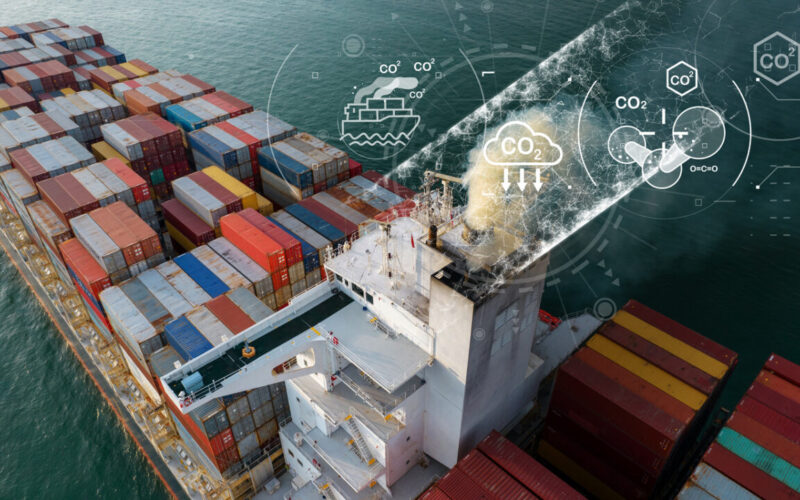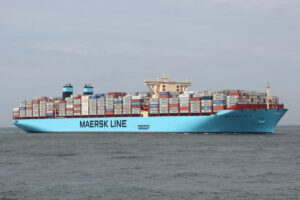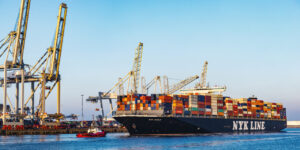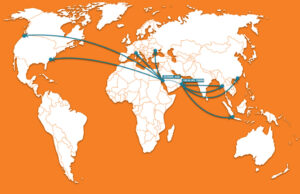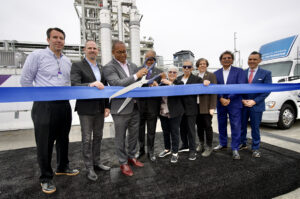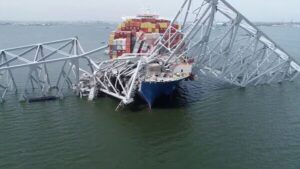Rakin Rahman, Staff Reporter at Port Technology International – PTI, sat down for an interview with Dr. Eleni Bougioukou, Innovation Manager at the Port of Tyne. The discussion focused on the Port of Tyne’s goals revolving sustainability and decarbonisation. Dr. Bougioukou spoke about how advances in technology could be leveraged as a tool to facilitate the push towards net-zero, and how digitalisation complements efforts towards decarbonisation. Eleni touched on several initiatives led by the port that goes beyond its operational goals but that also seeks to help the community at large while being a spearheading port for the industry to follow.
What are the Port of Tyne’s main sustainability and decarbonisation goals and how does the port aim to achieve them in the short- and long-term?
EB: The Port of Tyne is at the forefront of promoting a cleaner, greener and more sustainable maritime trade network. Our ambitious Green Port strategy, outlined in Tyne 2050, delivers the Port’s decarbonisation objective of achieving net-zero greenhouse gas (GHG) emissions by 2030 and transitioning to an all-electric port by 2040. Additionally, we are actively supporting the development of clean energy technologies through our Clean Energy Testbed initiative. This programme invites SMEs, clean energy companies, and academia to showcase their technologies within our industrial environment, fostering innovation and collaboration.
As a trust port, we have the flexibility to invest in green projects with a longer return on investment (ROI) without being pressured by shareholders, as all our profits are invested back in the port and our remit is to leave the port in a better condition for future generations. To fulfil this, each year we allocate 30 per cent of our annual capital expenditure (CapEx) to green initiatives, including investments such as the acquisition of a new electric van fleet for internal port use supported by EV charging points across the port, the purchase of new electric equipment and cranes and the installation of smart meters throughout the port to identify energy-saving opportunities.
Moreover, we have developed an ambitious plan for installing renewable energy systems across the port, including solar PV and wind power, as well as contemplating the supply of shore power to ships in port. In the upcoming year, we plan to kick off the installation of solar panels on the rooftop of our Net Zero Port Centric Warehouse, with subsequent installations in other port areas. This strategic approach underscores our commitment to advancing sustainability across the port infrastructure.
In addition, we are exploring innovative applications of hydrogen in our equipment for the future, while our UK Government funded feasibility study under the Clean Maritime Demonstration Competition Round 2, ‘Clean Tyne Shipping Corridor’, has enabled us to examine how the port can facilitate the bunkering of green fuels in the future. Finally, we are transitioning our heavy goods vehicle (HGV) fleet to Hydrotreated Vegetable Oil (HVO), to incorporate HVO also in our port plant and equipment, as an interim measure before transitioning to a fully electric port.
Why are decarbonisation and sustainability so important to the Port of Tyne?
EB: Given our proximity to the local community, our operations must prioritise sustainability and maintain clean air quality for the region. Therefore, our primary goal is to act as sustainably as possible, setting an example for other ports to follow, by placing sustainability at the core of all our operations. This commitment extends to our customers and supply chain partners, as we strive for a green approach in every aspect.
We also take pride in having the UK’s sole 2050 Maritime Innovation Hub, where collaboration across sectors is actively pursued, with the hub serving as a platform and catalyst for sharing ideas, harnessing research and development, advancing technology and tackling shared challenges in various areas including sustainability and decarbonisation. It’s a space where innovation flourishes, bringing forth the best ideas and fostering collaboration among innovators from various sectors, academia and SMEs.
Could you touch on the intricate relationship between digitalisation and decarbonisation? Highlighting specific examples of how these two initiatives complement and reinforce each other.
EB: Our initial venture into integrating decarbonisation and digitalisation occurred last year through the ‘Clean Tyne’ project. This project was funded by the UK Government under the Clean Maritime Demonstration Competition Round 1. This was delivered in collaboration with Newcastle University, Siemens, Connected Places Catapult and the North East Local Enterprise Partnership. The consortium leveraged their extensive technical expertise, academic research and wider industry knowledge to define a path to net zero enabled by a real-time digital platform, which can play a fundamental role throughout the port’s decarbonisation journey, by supporting the creation of business cases, scenario planning and investment cases.
This project was an excellent opportunity to apply novel concepts of digitalisation in real-world energy systems and develop new solutions for ports that cut across energy systems, marine transport and data, helping reduce carbon emissions.
READ: Port of Tyne, Tidalis deploy next-generation VTS system
The Port of Tyne has this week launched the Venture Connect Green Investment Programme. Could you tell me a bit more about this and its objective pertaining to decarbonisation?
EB: Venture Connect and the Investment Hub serve as intermediaries, bridging the gap between innovative clean SMEs and investors. Initially, we plan to launch a programme that involves bringing SMEs on board, providing them with coaching from investors and experts on effectively pitching their technology to potential investors. This programme will operate in yearly cohorts, positioning us as brokers between forward-thinking, green, and decarbonisation-focused SMEs and investors.
This initiative aligns with our sustainability goal of serving as a clean energy testbed and our aim is to support organisations committed to decarbonisation, fostering their success. As part of this effort, organisations involved in the Clean Energy Testbed project can also benefit from our programme.
READ: Port of Tyne launches UK’s first site-wide private network
Venture Connect is said to offer assistance to businesses, universities, and startups working on decarbonisation solutions for the maritime sector. Why is it important for the Port of Tyne to extend its support to encompass entities beyond its operations?
EB: Our ambition extends beyond merely being a port; we aspire to lead the sector by uniting diverse stakeholders to propel the maritime industry towards a greener future. The Tyne 2050 strategy goes beyond port-centric considerations, as we prioritise the community, aiming to contribute by generating more jobs, particularly green jobs, addressing the skill needs of the sector, and actively engaging and inspiring young individuals to join the maritime industry.
READ: 2050 Maritime Innovation Hub launches Venture Connect
As mentioned earlier, we play a pivotal role in fostering relationships between stakeholders and SMEs, bridging the gap with other sectors and companies in the realm of decarbonisation and digitilisation. Our goal through initiatives like the Clean Energy Testbded, Venture Connect and the 2050 Maritime Innovation Hub is to stay at the forefront and exemplify our commitment to enhance the sector’s capabilities to expedite the transition towards a cleaner maritime future.
Could you give me an overview of the Carbon Literacy Toolkit?
EB: The Carbon Literacy Trust is a charity dedicated to raising awareness within organisations about carbon dioxide costs and the impacts of everyday activities and climate change. Their mission involves educating organisations’ workforce on these topics and empowering individuals to contribute to minimising emissions at work and in their personal lives.
Recognising a gap in our sector, specifically the port industry, the Port of Tyne took the initiative, leveraging the 2050 Maritime Innovation Hub and collaborating with other ports to bring additional expertise into the development of a customised toolkit, which was completed this year. This announcement was made during Maritime Innovation Week last year.
With our newly devised toolkit, we departed from the traditional one-day, in-person workshops, and opted for a more contemporary approach to learning and development initiatives. The toolkit features brief, AI-delivered videos that we crafted, providing convenient access to the content. These videos are complemented by an in-person workshop where participants can engage in discussions, share experiences, and collaboratively devise action plans.
The action plan is a crucial component, outlining the specific steps attendees intend to take immediately following the programme’s conclusion. This involves commitments both in their professional and personal lives. In essence, this initiative emphasizes that regardless of their sector, each person can make a meaningful contribution to minimise emissions and positively influence the overall transition.

Dr. Eleni Bougioukou, Innovation Manager at the Port of Tyne, spearheads the oversight and execution of initiatives in sustainability-focused innovation and technology. Her role involves steering the strategic development and practical implementation of activities essential for realising the port’s ambitious net zero and environmental goals.

